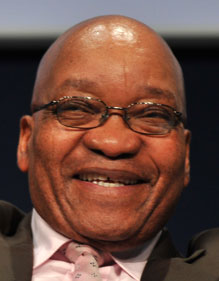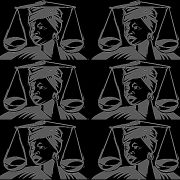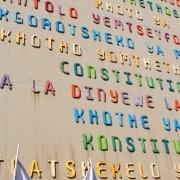|
Getting your Trinity Audio player ready...
|
 By Gareth Newham, division head for governance, crime and justice, ISS Pretoria
By Gareth Newham, division head for governance, crime and justice, ISS Pretoria
First published in the Sowetan
While speaking to local government officials recently, South African President Jacob Zuma jokingly said: "Anything that goes wrong in the country it’s 'that Zuma'. I’m sure even if a person falls from a chair, [they’d say] 'this bloody Zuma man made me fall'."
Holding the president liable may, however, be justified when it comes to the unparalleled leadership crises facing the South African Police Service (SAPS) and the National Prosecuting Authority (NPA). Since he is the only person who can appoint and remove the leaders of these institutions, he is directly to blame for problems at this level.
South Africans have recently watched the minister of police, Nathi Nhleko, squander well over a million rand thanks to his unlawful suspension of the head of the Hawks, Lieutenant Anwa Dramat, and Gauteng Hawks head, Major General Shadrack Sibiya. Neither man is facing criminal or disciplinary charges. Reports that Dramat has been offered R3-million to resign from the Hawks bring into question whether there is any real evidence against him. Why pay him millions if he can be fired for misconduct?
Rather than appointing one of the many highly professional and experienced men and women in the Hawks to replace Dramat, Nhleko decided to replace him with Major General Berning Ntlemeza: a man whom the North Gauteng high court found to be "dishonest’ and lacking ‘integrity and honour" for lying under oath.
One has to wonder why the minister is willing to risk undermining, and perhaps even irreparably damaging the public credibility and morale of the Hawks by allowing someone so untrustworthy to remain in such an important position.
Given that Nhleko is generally seen as someone who understands the importance of stability in the agencies under his watch, he is probably taking direction from his boss.
Corruption accused a slippery bunch
If that wasn’t enough, in the last few days there have been confusing and distressing news articles about attempts to hold Advocate Nomgcobo Jiba, one of the deputy directors of public prosecutions, accountable for the unlawful abuse of her prosecutorial powers. Jiba is facing criminal charges and removal from the roll of advocates after repeated court judgements berating her for irrationally and illegally withdrawing charges against former crime intelligence boss, Richard Mdluli, and prosecuting anti-corruption investigator Major General Johan Booysen without any evidence.
A firm Zuma ally, Mdluli is facing a myriad of criminal charges ranging from murder to corruption. The evidence against Mdluli was used last year to fire his second in command, Solly Lazarus. Despite this, Mdluli allegedly continues to be employed in the SAPS without disciplinary action being taken against him.
During recent efforts by the national director of public prosecutions, Mxolisi Nxasana, to suspend Jiba given her unlawful conduct, SAPS National Commissioner Riah Phiyega attempted to intervene in her favour, leading to a war of words between the two. It has also emerged that the previous investigator, Lieutenant-Colonel Botes, was taken off the Jiba case and replaced with another strong Zuma ally, Major-General Norman Taioe, whose poor investigation and testimony assisted Zuma in escaping a rape conviction in 2006. It won’t be too surprising if we see a repeat of that dismal performance in the case against Jiba.
Police and NPA unable to tackle corruption
The crisis of leadership in the police and the NPA has substantially undermined their ability to tackle crime and corruption in South Africa. It also undermines public trust in these institutions at a time when there is a substantial upsurge in armed attacks on people walking the streets, relaxing in their homes, working in their small businesses or visiting shopping centres.
Over the past two years, the number of armed robberies has increased by over 18 000 cases, or 50 more attacks every day on average. This has contributed to the increase of over 1 700 more murders, with four more people killed every day on average than two years ago.
The problem is not new. The National Planning Commission, as far back as 2011 – during Zuma’s first term – diagnosed the police as having a leadership crisis. It is for this reason that the National Development Plan contains very specific recommendations, including:
- Establishing a multi-sectoral and multi-disciplinary National Policing Board, to ensure clear standards for senior appointments to the SAPS.
- Ensuring that the appointment of national and deputy national commissioners of police are based on merit and follow a transparent and competitive recruitment process (which was not the case in the appointment of Phiyega as SAPS national commissioner)
- That all senior officers are assessed to ensure that they have the expertise to fulfil the requirements of the posts they hold (which was not the case with the irregular appointment of Mdluli as head of crime intelligence)
Now, even if these recommendations were to be applied to both the SAPS and NPA, it will take some time for South Africans to feel assured that these important criminal justice institutions are led by capable men and women whose integrity is beyond question. Given the substantial resources available to the SAPS and the vast expertise of many police officers and prosecutors, the right type of leadership could ensure that they are able to get on top of the serious violent crime wave that our country continues to face.
The question is why Zuma does not follow the recommendations of the National Development Plan and use his constitutionally mandated powers to appoint the best possible leadership to the criminal justice system. Why does he seem to repeatedly appoint unethical and inexperienced people to head the criminal justice system, and then appear content to allow chaos to reign despite its toll on public safety?
Perhaps Zuma needs to protect many of his benefactors who are involved in crime and corruption? Or perhaps he believes a compromised criminal justice system will assist him in future if he ever has to answer the 782 criminal charges for fraud and corruption that may one day be reinstated against him. One thing is certain; time will tell.








